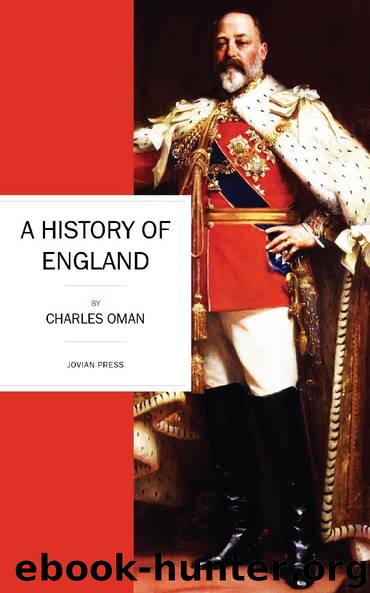A History of England by Charles Oman

Author:Charles Oman
Language: eng
Format: epub
Publisher: Jovian Press
CROMWELL.
1651-1660.
~
AFTER THE “CROWNING MERCY” OF Worcester fight, the rule of England lay nominally in the hands of its mutilated and discredited House of Commons, the representative of a mere fraction of the nation. But really the power to move the realm was in the hands of the army, which had made, and could as easily unmake, the mockery of representative government which sat at Westminster. And in the army Cromwell was growing more and more supreme; his old colleague Fairfax had sunk back into civil life; his mutinous subordinates the Levellers had been crushed; the colonels and generals who held power under him were for the most part his humble servants.
Cromwell had as yet no official post corresponding to his real omnipotence. He was commander of the army, and a member of the Council of State, but nothing more. His will, nevertheless, was the main factor in the governance of England.
It is time to say a few words of the character of this extraordinary man, whom we have hitherto seen merely as the heaven-sent leader of the Parliamentary armies, and the guiding spirit of the Independent party. Oliver was a county gentleman of Huntingdonshire, a man of religion from his youth up, and a prominent member of the Parliaments of 1628 and 1640. He was more than forty years old before he ever drew sword or put a squadron in battle array. No general save Julius Cæsar ever started on a great military career so late in life. Cromwell himself aimed at being a reformer of the life and faith of the nation much more than a soldier. He had taken to war because the times required it, but military power and military glory was not his end in life. He wished to see England orderly, prosperous, and free, according to his ideas of freedom in things spiritual and temporal. In religion his ideal was the Independent system, in which the state tolerated most forms of worship, and was itself committed to none. In things temporal he wished to see the realm ruled by a truly representative House of Commons, where every district should be represented according to its population. He had no patience for the existing House, in which a haphazard arrangement, dating back from the middle ages, gave no fair representation to England—where the vanished boroughs of Dunwich or Sarum had as many members as Yorkshire or Norfolk. If Cromwell had found a House of Commons that agreed with his views, he would have worked smoothly with them, and lived and died no more than their first servant.
Unfortunately, however, Cromwell’s views did not happen to be shared by any large proportion of the nation. Half England was secretly Episcopalian; a large proportion of the rest was Presbyterian; among his own Independent party there were numberless sects and factions. In the constitution of England, then as now, there was no place for an over-great personality backed by a strong military force. But such a personage existed in Cromwell. The
Download
This site does not store any files on its server. We only index and link to content provided by other sites. Please contact the content providers to delete copyright contents if any and email us, we'll remove relevant links or contents immediately.
| Africa | Americas |
| Arctic & Antarctica | Asia |
| Australia & Oceania | Europe |
| Middle East | Russia |
| United States | World |
| Ancient Civilizations | Military |
| Historical Study & Educational Resources |
Elizabeth by Philippa Jones(1862)
Mary Boleyn by Alison Weir(1465)
Traitors of the Tower by Alison Weir(1359)
A Journal of the Plague Year (Oxford World's Classics) by Daniel Defoe(1228)
Eleanor of Aquitaine by Marion Meade(1085)
Moon Tiger by Penelope Lively(1070)
A Short History of England by Simon Jenkins(1066)
The Real Middle Earth by Brian Bates(1049)
Life of Pi by Yann Martel(1031)
London Under by Peter Ackroyd(1017)
Notes From a Small Island by Bill Bryson(1011)
Queen Isabella by Alison Weir(1005)
American Idol by Richard Rushfield(924)
Her Majesty's Spymaster by Stephen Budiansky(909)
Tudors Versus Stewarts by Linda Porter(906)
Albion by Peter Ackroyd(838)
The Creation of Anne Boleyn by Susan Bordo(814)
Cromwell, Our Chief Of Men by Fraser Antonia(814)
Children Of England: The Heirs of King Henry VIII 1547-1558 by Weir Alison(812)
